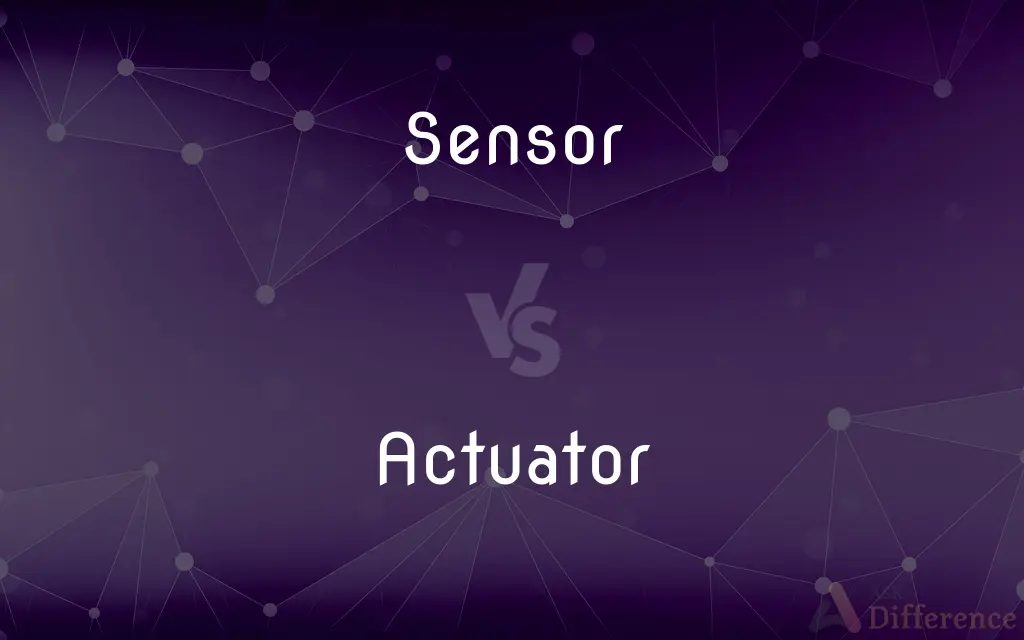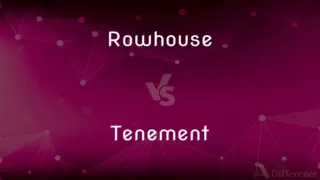Sensor vs. Actuator — What's the Difference?
By Maham Liaqat & Urooj Arif — Updated on April 16, 2024
Sensors detect or measure physical properties, while actuators convert signals into physical action.

Difference Between Sensor and Actuator
Table of Contents
ADVERTISEMENT
Key Differences
Sensors are designed to detect changes and properties in their environment, such as temperature, light, or pressure. On the other hand, actuators are mechanisms that act upon an environment by moving or controlling a mechanism or system.
In a feedback system, sensors play a crucial role in gathering data that informs system adjustments. Whereas, actuators are responsible for executing those adjustments by altering physical conditions based on the data provided.
Sensors often output data in the form of electrical signals which can be measured and analyzed. In contrast, actuators require input signals, typically from a control system, which they then convert into physical movement or other outputs.
The effectiveness of sensors is measured by their accuracy and sensitivity to changes in their specific environment. Conversely, actuators are evaluated based on their precision and ability to consistently perform the actions they are designed to undertake.
Sensors typically do not interact directly with their environment, but rather passively collect data from it. However, actuators directly interact with and alter their environment through physical force or movement.
ADVERTISEMENT
Comparison Chart
Function
Detects or measures environmental properties
Executes physical action based on input
Output
Electrical signal
Physical movement or action
Role in systems
Data collection
Execution of system commands
Primary evaluation
Accuracy and sensitivity
Precision and reliability
Interaction with environment
Passive
Active
Compare with Definitions
Sensor
Often integrated into larger systems for automation and control.
Light sensors adjust screen brightness on smartphones automatically.
Actuator
Provides the necessary action in response to a control signal.
A linear actuator opens or closes windows automatically depending on temperature settings.
Sensor
Used to monitor conditions in both natural and artificial environments.
Humidity sensors help manage climate control systems.
Actuator
Integral to machines that require physical operation.
An electric actuator operates valves in industrial pipelines.
Sensor
A device that detects changes in physical input from its environment.
A temperature sensor measures the heat in a room.
Actuator
A component that moves or controls a system or mechanism.
An actuator in a robotic arm assists in manufacturing processes.
Sensor
Can be specialized for various applications, such as pressure, light, or sound sensors.
Pressure sensors activate airbags during a car crash.
Actuator
Can be controlled manually or through automated systems.
Motorized actuators adjust the position of satellite dishes.
Sensor
Relays information to other devices, usually in the form of electronic data.
A motion sensor sends an alert to your security system when it detects movement.
Actuator
Converts energy into motion.
Hydraulic actuators convert fluid power into mechanical force.
Sensor
In the broadest definition, a sensor is a device, module, machine, or subsystem whose purpose is to detect events or changes in its environment and send the information to other electronics, frequently a computer processor. A sensor is always used with other electronics.
Actuator
An actuator is a component of a machine that is responsible for moving and controlling a mechanism or system, for example by opening a valve. In simple terms, it is a "mover".
Sensor
A device, such as a photoelectric cell, that receives and responds to a signal or stimulus.
Actuator
One that activates, especially a device responsible for actuating a mechanical device, such as one connected to a computer by a sensor link.
Sensor
See sense organ.
Actuator
Something that actuates something else.
The mind is the actuator of the body.
Sensor
A device or organ that detects certain external stimuli and responds in a distinctive manner.
Actuator
A usually electric device that causes a mechanical device (i.e., a mechanism) to be switched on or off. For example; an electric motor that opens and closes a valve.
Sensor
Sensory; as, the sensor nerves.
Actuator
(computer hardware) The mechanism that moves the head assembly on a disk drive.
Sensor
Any device that receives a signal or stimulus (as heat or pressure or light or motion etc.) and responds to it in a distinctive manner
Actuator
(electrical) A relay that controls the flow of electricity.
Actuator
One who actuates, or puts into action.
Actuator
A mechanism that puts something into automatic action
Common Curiosities
What is a sensor?
A device that detects and responds to some type of input from the physical environment.
What are common types of sensors?
Common types include temperature, pressure, motion, and light sensors.
How do sensors and actuators work together?
Sensors collect data which is used to control actuators that then modify physical conditions.
Where are sensors and actuators commonly used?
In automated systems like manufacturing lines, robotics, and home automation systems.
What determines the choice of a sensor over an actuator in a system?
The need to either gather information or to execute a control action determines the choice.
Are sensors and actuators used in consumer electronics?
Yes, commonly in devices like smartphones and home automation systems.
How do sensors affect the usability of a product?
By providing necessary data to enhance and personalize user experiences.
How do actuators enhance industrial automation?
They enable precise control over mechanical processes, improving efficiency and safety.
What is an actuator?
A mechanism that manipulates a device or system based on received signals.
Can a device be both a sensor and an actuator?
Typically, devices are specialized to either sense or actuate, but some technologies, like certain types of valves, incorporate both functions.
What are common types of actuators?
Common types include hydraulic, pneumatic, and electric actuators.
What innovations are impacting actuator technology?
Developments in materials science and smart systems are enhancing capabilities.
Can sensors operate without actuators?
Yes, sensors can function to collect and transmit data independently of actuators.
Can actuators operate without sensors?
While possible, most modern actuator applications rely on sensor data for precision and adaptability.
What innovations are impacting sensor technology?
Advances in nanotechnology and IoT connectivity are driving improvements.
Share Your Discovery

Previous Comparison
Celebrant vs. Celebrator
Next Comparison
Rowhouse vs. TenementAuthor Spotlight
Written by
Maham LiaqatCo-written by
Urooj ArifUrooj is a skilled content writer at Ask Difference, known for her exceptional ability to simplify complex topics into engaging and informative content. With a passion for research and a flair for clear, concise writing, she consistently delivers articles that resonate with our diverse audience.











































